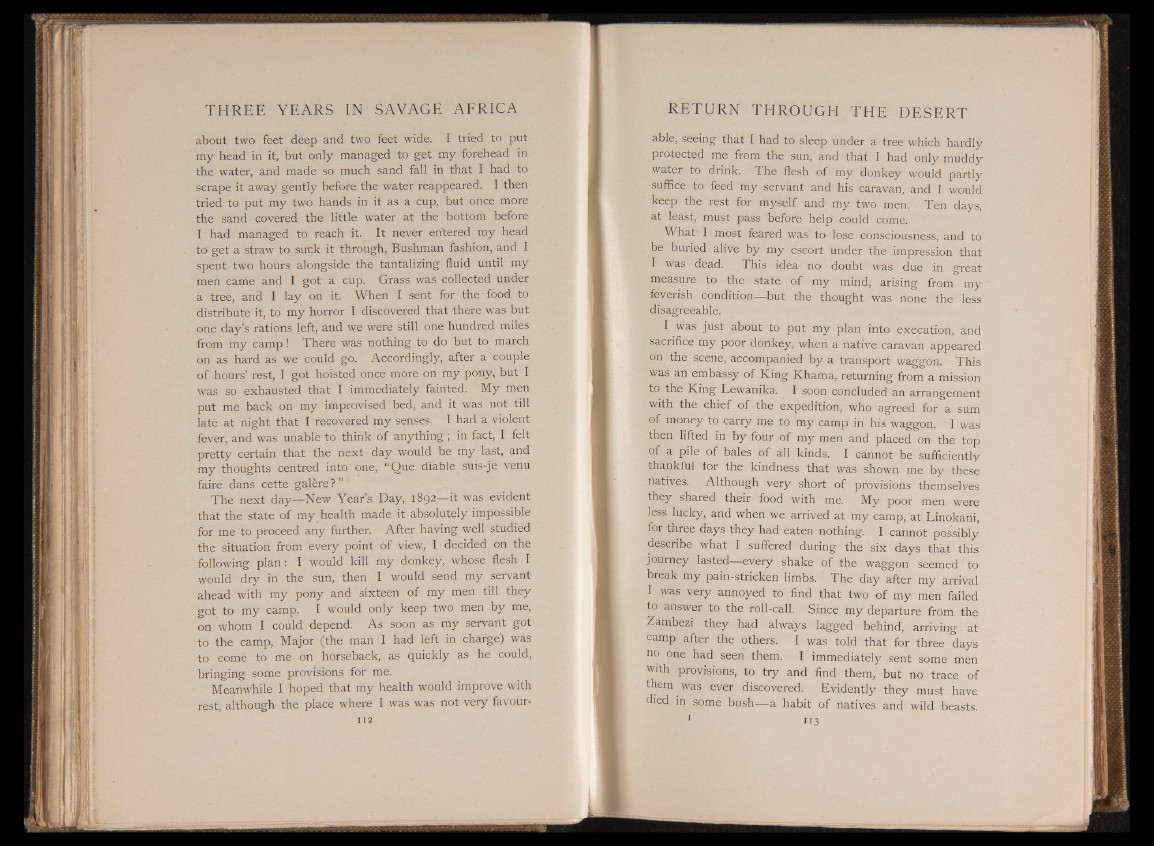
about two feet deep and two feet wide. I tried to put
my head in it, but only managed to get my forehead in
the water, and made so much sand fall in that I had to
scrape it away gently before the water reappeared. I then
tried to put my two hands in it as a cup, but once more
the sand covered the little water at the bottom before
I had managed to reach it. It never entered my head
to get a straw to suck it through, Bushman fashion, and I
spent two hours alongside the tantalizing fluid until my
men came and I got a cup. Grass was collected under
a tree, and I lay on it. When I sent for the food to
distribute it, to my horror I discovered that there was but
one day’s rations left, and we were still one hundred miles
from my camp ! There was nothing to do but to march
on as hard as we could go. Accordingly, after a couple
of hours’ rest, I got hoisted once more on my pony, but I
was so exhausted that I immediately fainted. My men
put me back on my improvised bed, and it was not till
late at night that I recovered my senses. I had a violent
fever, and was unable to think of anything ; in fact, I felt
pretty certain that the next day would be my last, and
my thoughts centred into one, “Que diable suis-je venu
faire dans cette galère ? ”
The next day—New Year’s Day, 1892—it was evident
that the state of my health made it absolutely impossible
for me to proceed any further. After having well studied
the situation from every point of view, I decided on the
following plan : I would kill my donkey, whose flesh I
would dry in the sun, then I would send my servant
ahead with my pony and sixteen of my men till they
got to my camp. I would only keep two men by me,
on whom I could depend. As soon as my servant got
to the camp, Major (the man I had left in charge) was
to come to me on horseback, as quickly as he could,
bringing some provisions for me.
Meanwhile I hoped that my health would improve with
rest, although the place where I was was not very favourable,
seeing that I had to sleep under a tree which hardly
protected me from the sun, and that I had only muddy
water to drink. The flesh of my donkey would partly
suffice to feed my servant and his caravan, and I would
keep the rest for myself and my two men. Ten days,
at least, must pass before help could come.
What I most feared was to lose consciousness, and to
be buried alive by my escort under the impression that
I was dead. This idea no doubt was due in great
measure to the state of my mind, arising from my
feverish condition—but the thought was none the less
disagreeable.
I was just about to put my plan into execution, and
sacrifice my poor donkey, when a native caravan appeared
on the scene, accompanied by a transport waggon. This
was an embassy of King Khama, returning from a mission
to the King Lewanika. I soon concluded an arrangement
with the chief of the expedition, who agreed for a sum
of money to carry me to my camp in his waggon. I was
then lifted in by four of my men and placed on the top
of a pile of bales of all kinds. I cannot be sufficiently
thankful for the kindness that was shown me by these
natives. Although very short of provisions themselves
they shared their food with me. My poor men were
less lucky, and when we arrived at my camp, at Linokani,
for three days they had eaten nothing. I cannot possibly
describe what I suffered during the six days that this
journey lasted—every shake of the waggon seemed to
break my pain-stricken limbs. The day after my arrival
I was very annoyed to find that two of my men failed
to answer to the roll-call. Since my departure from the
Zambezi they had always lagged behind, arriving at
camp after the others. I was told that for three days
no one had seen them. I immediately sent some men
with provisions, to try and find them, but no trace of
them was ever discovered. Evidently they must have
died in some bush—a habit of natives and wild beasts.
1 113